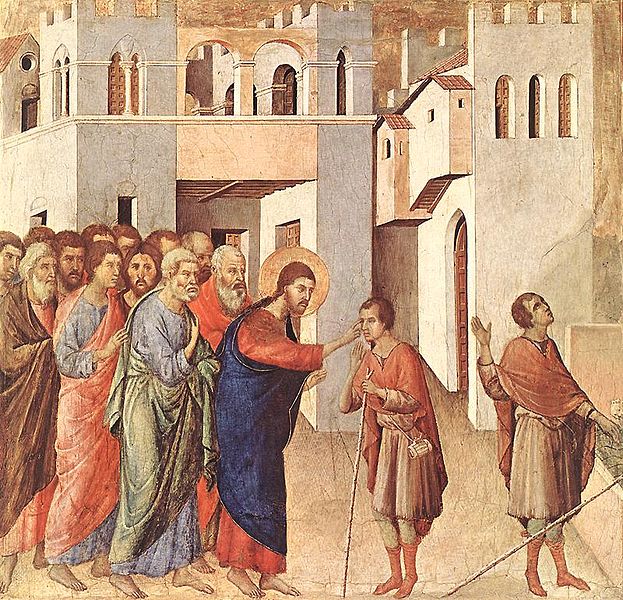Two blind men restored, and the dumb made to speak
Two Blind Men. A Dumb Demoniac.
(The Gospel History, Section 58)
And as Jesus passed by from thence, two blind men followed him, crying out, and saying, Have mercy on us, thou son of David. And when he was come into the house, the blind men came to him: and Jesus saith unto them, Believe ye that I am able to do this? They say unto him, Yea, Lord. Then touched he their eyes, saying, According to your faith be it done unto you. And their eyes were opened. And Jesus strictly charged them, saying, See that no man know it. But they went forth, and spread abroad his fame in all that land.
And as they went forth, behold, there was brought to him a dumb man possessed with a devil. And when the devil was cast out, the dumb man spake: and the multitudes marvelled, saying, It was never so seen in Israel. But the Pharisees said, By the prince of the devils casteth he out devils.
Two blind men restored, and the dumb made to speak
(The Saviour of the World, Vol III Book III Poem XXXIII)

Never to see the redness of the dawn,
The tender hues of eve;
Never perceive—
From all that knowledge comes of sight, withdrawn—
When friends do grieve;
Or, be there happy smile on face we love,
How shall joy move
Our fellowship when we no sign may see?
In desolate places must the blind man be.
This blind man hath a brother found, one blind
Like him, shut out from sight
Of all delight;
Like him, alone amongst his friendly kind
Who see the light!
Together make these their own little joys;
Escape annoys
In talk of all those things move a man’s heart
The most, when he from others goes apart.
To-day, great news stirs those two lonely souls;
Friends give them news of One,
Great David’s Son,
Who all afflictions of mankind controls,
Speaks, and ’tis done!
The blind go seeing and the deaf men hear!
“Nay, then, shall fear
Keep us from Him the King of men, so great,
Alone, He rules man’s intimate estate!”
Lo, He comes by! They follow—cry on Him;
Eager and loud they cry,
Lest He pass by,
Nor ever hear their voice nor know how dim
To sightless eye
Are all delights of beauteous world He made!
“Have mercy!” said
The two blind men—His mercy all their plea,—
“Have mercy, Lord, and bid Thy servants see!”
Entered the house had Christ, and bade them rise:
One question asks the Lord,—
“Think ye My word
Is able to give sight to darkened eyes?”
The blind men heard;
With leaping heart together they cried out
Without one doubt,—
“Yea, Lord, we know that Thou canst bid us see!”
“According to your faith, so shall it be!”
He touched their eyes—so potent and so kind
A touch, sure never fell,
So soft a spell,
So quick, as made to see these two poor Blind!
Ah, it was well
With them that day when seeing, forth they went
And knew Christ sent—
Deliverer of poor souls in darkness lay,
That they might share the gladness of the Day!
One other prisoner groaning in the pit
He passeth in His way;
The light of day
This man perceives; but silent he must sit,
Nor word can say
Of thoughts all turned to bitterness that surge
And utt’rance urge
Of his sealed lips: Christ’s pity set him free!
“He makes the dumb to speak, the blind to see!”—
Cried out the marvelling multitudes amazed,—
“Our Fathers never saw
Since came the Law,
Prophet could thus set captive prisoners free!”
To Thee draw we,—
We who go blind to Thy sweet ways of grace,
Nor see Thy face,
Nor with glad tongue Thy tender mercies own—
Except Thou pity, Christ, we are undone!
St. Matthew ix. 27-34.
[1] Christ Healing the Two Blind Men, by Duccio (Sienese: about 1260-1340)
The departure from conventional forms which was characteristic of Duccio, is conspicuous in this picture. Each of the disciples has an individual character, the entire group representing not conventional but living types of men. There is a piece of symbolism in the blind man who has already been healed, which should not escape notice. Duccio is not content to represent the bare act of healing, but insists upon the efficacy of the touch of Him who was the Light of the World, by making the blind man drop the staff of which he has no longer need. There is another piece of symbolism in the gradated scale by which he draws attention to the respective dignities of his characters—Christ being the tallest in the picture, the blind man the shortest. (A. H. Macmurdo in Century Guild Hobby Horse, 1886.)
From Mr. Cook’s Handbook to the National Gallery.